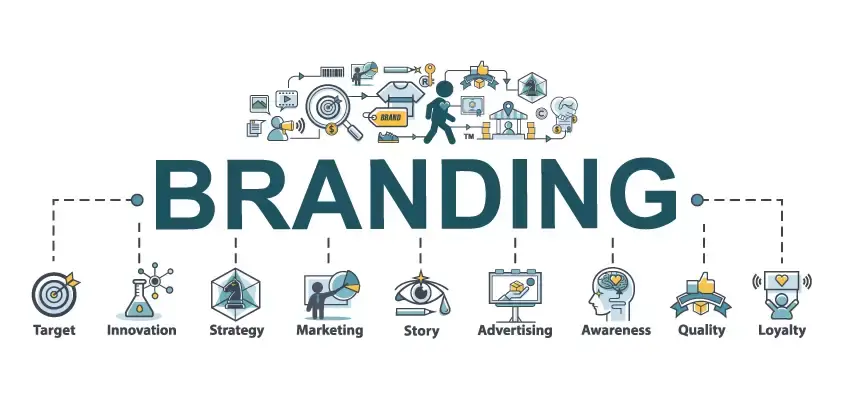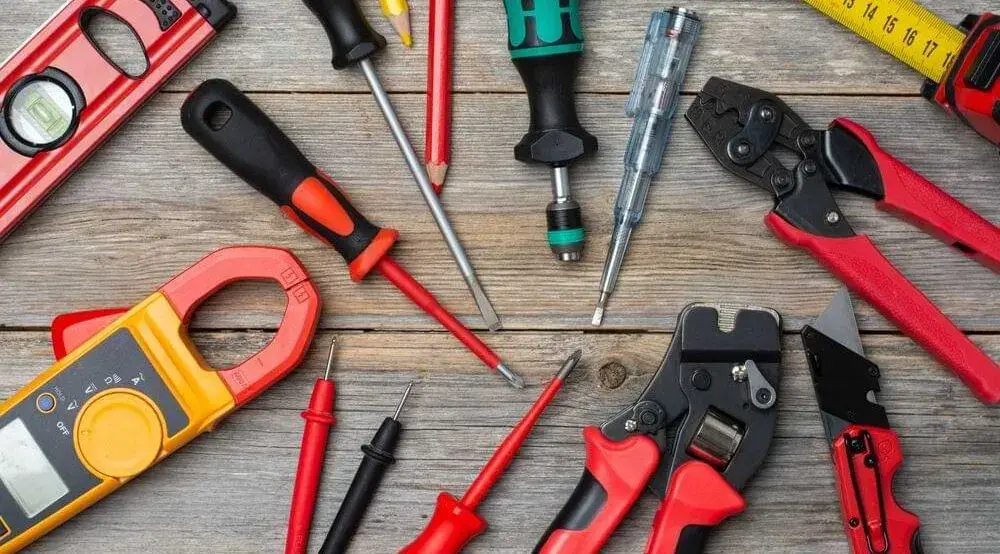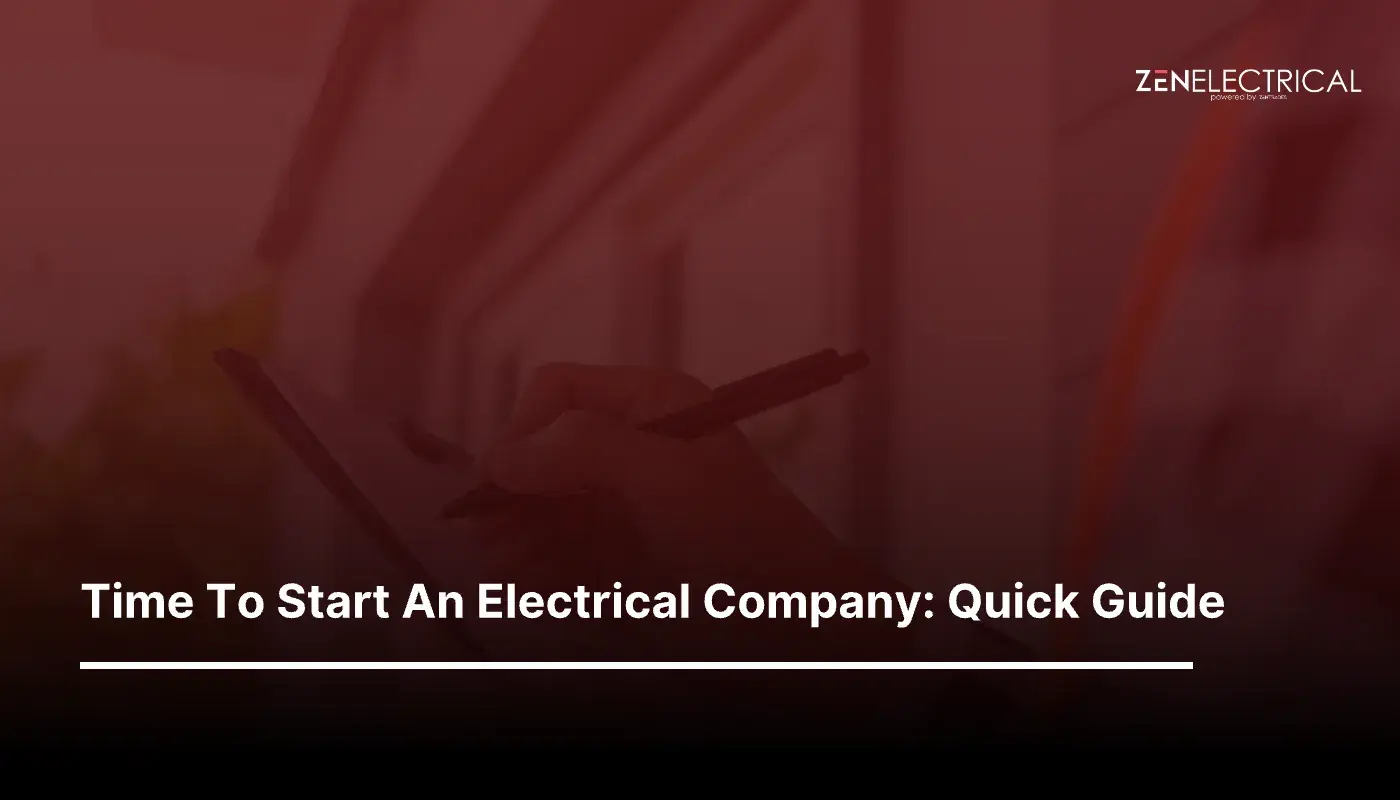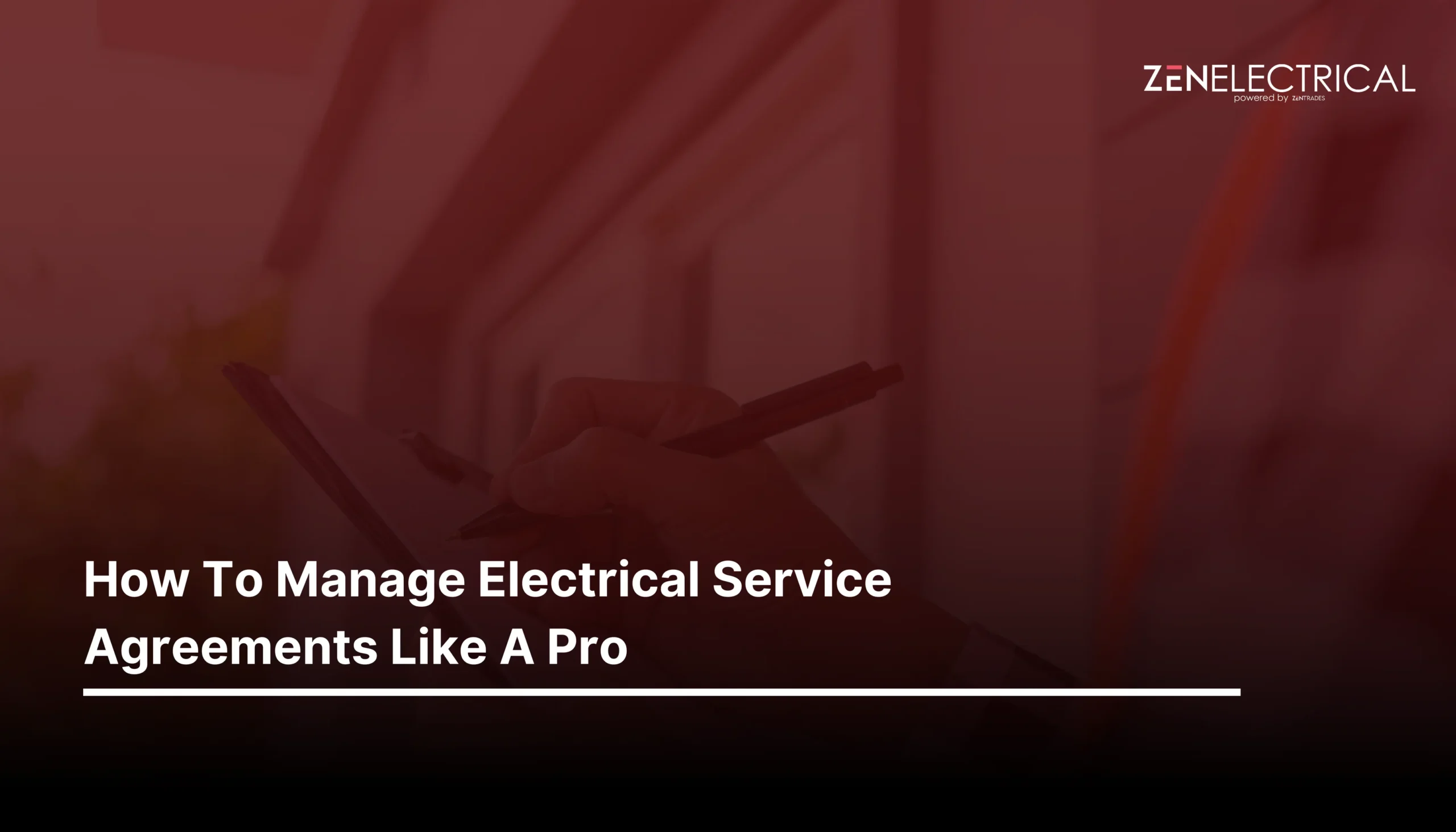Starting An Electrical Company: A Comprehensive Guide To Establishing Your Electrical Contracting Business
- ZenElectrical
- 9 Min Read
Working as an apprentice and then leveling up to gaining hands-on experience as a senior electrician, you may be wondering what the next step could be. You may have considered starting your electrical contracting business but are unsure how to go about it.
In this blog post, we will explore how to start an electrical contracting business with a few easy steps. We will also discuss what it means to be your own boss and the challenges you might face while reaping the innumerable benefits of being an electrical business owner.

Here What We Cover
Covering Ground: Key Pre-steps To Starting Your Own Electrical Business

To start your own electrical contracting business, you must meet certain criteria before being eligible to become an independent electrical contractor.
First things first, you need to complete all three levels of an electrician’s career: apprentice, journeyman, and master.
Step 1: Apprenticeship
As an apprentice electrician, you need to complete your high school diploma or GED and get into an apprenticeship program. Electrician trade schools can also serve as an equivalent alternative to an apprenticeship program. In this program, you complete the required number of classroom hours (approximately 800) along with years (4 to 5 years, almost 8000 hours) of on-field experience to advance to the next level—journeyman electrician.
Step 2: Journeyman
You need to pass your journeyman electrician exam to start working as a licensed electrician in your area. You need to have enough expertise and knowledge in electrical work, electrical installations, electrical wiring, electrical fire hazards, electrical tools, and other electrical jobs gained from your apprenticeship to ace your test and get your licensure. After qualifying as a journeyman electrician, you need an additional 4000 hours of training, which can take two to three years of service. Only then can you advance to the final level – master electrician.
Step 3: Master
Becoming a master electrician can be challenging, requiring expertise in domains like installing, maintaining, and repairing complex electrical systems, drafting and implementing blueprints, guiding and supervising apprentice and journeyman electricians, and many more. We have created a guide on becoming a master electrician, which will help you learn more.. They are the highest level of certification one can receive in this field. You need to take the master electrician exam to qualify and get your license.
There are also various kinds of electricians, such as:
- residential electricians
- commercial electricians
- maintenance electricians
- solar panel electricians, etc.
One can choose these specializations depending on one’s interests and area of expertise.

Use our free estimate template now
Make winning quotes in minutes—for any industry and any job.
It's Time For Your Own Electrical Contracting Business!
You have obtained all the necessary qualifications to start your own electrical contracting business. Now, it’s time to get started on the journey of actually building your electrical business from scratch.
However, in many jurisdictions, you might need a separate jurisdiction license to operate as an electrical contractor and start your own electrical contracting business. A electrical business license legally allows you to operate your business and execute electrical work projects. Hence, check with your locality for the appropriate terms and conditions and eligibility requirements.
Creating A Business Plan

A robust business plan is crucial for starting a business. You cannot build a successful electrical business without a comprehensive and detailed plan. The plan is imperative to ensure clarity about your goals, targets, niche market, and other vital nitty-gritty of your business.
What should your business plan include?
An executive summary: This includes a short summary of your company, its mission, vision, and objectives. You can also state your services, the market your company is catering to, and how your business is well-suited to fill the gap.
Company overview: This includes the ownership and legal structure of your company, along with its physical information, such as its address.
Market analysis: This includes a target market analysis, which is the market your services are catering to. It also includes competitor analysis and identifying the ongoing electrical industry trends and how they impact your business.
Services offered: This enlists the scope and range of services you are planning to offer your potential customers. It also includes your USP, which explains why your customers should choose you over your competitors.
Sales and marketing strategy: Outline the strategy you will implement to market your services and attract clients. Also, your sales strategy should include how you can convert your clients into a long-term customer base and foster loyalty to achieve your revenue goals.
Operations and management: This entails the day-to-day workflow and procedures for conducting your business. This includes the equipment, technology, and suppliers that you use for your business. It should also include the organizational structure of your business, like roles and responsibilities, the key managers and stakeholders, and your hiring and training program for your employees.
Finances: This includes all the financial projections for your company, at least for the starting year of your business. It includes your revenue model like pricing structure, employee rates, and any funding requirements such as business loans, insurance, initial costs, etc.
Choose A Business Structure

The next step is to decide on a business structure. You need to do this before you register your electrical business. When just starting out as new electrical business owners, parameters should be set keeping in mind that it’s a small business.
When setting up the structure, you can opt for three different options:
Sole proprietorship
Limited liability company (LLC)
Partnership
A sole proprietorship means you will be the sole owner and completely own your business.
Partnership refers to having more than one owner of the business.
On the other hand, LLC refers to keeping your professional assets separate from your personal assets, which can safeguard you against any financial issues you face.
Make sure to choose a business structure that suits your electrical contracting business and aligns with its needs and goals before starting your electrical business.
Get posts like this in your inbox.
Keep learning how to run a 5-star business with our bi-weekly newsletter.
Setting Up Your Electrical Contracting Business
Once you have prepared your business structure and plan, it’s time to set up your electrical business! There are a lot of key aspects that you should prioritize. Let’s look at them one by one
Branding

First and foremost, you need to set the tone of your branding right so that it aligns with your business goals and needs. You also need an appropriate business name and the perfect logo, which should be the identity of your business.
Your branding communicates the company values and mission and begins to paint a positive image within your readers’ minds. Every element that makes up your branding should be consistent in its look and feel—from your website, which should be optimized for search engines, to your marketing channels and even your social media profiles. This will help create brand recognition and loyalty over time.
In addition, there are vital aspects such as brand voice and messaging. How you communicate with your customers must be relatable enough while promoting who you are as a brand. The last piece would be to protect your brand by trademarking your name and logo so that you stand out in the marketplace.
Service Offerings

Next, decide on the electrical services you want to offer to your potential customers. Some common services include:
Installing, repairing, and maintenance of electrical systems
Inspection of electrical safety equipment
Upgrade services
Wiring and electrical installation
Indoor and outdoor lighting
Emergency electrical services
Secure Funding

Building your electrical contracting business from scratch means you will be required to invest a huge sum of money right at the very beginning. And unless you have that kind of money collecting dust in your bank account, you will need to make arrangements.
You can do any of the following:
Apply for a small business loan through the bank
Get angel investors or ask your family and friends to invest in your business
Business Insurance

Having the right insurance can help a small electrical contracting business protect itself from potential risks or liabilities. The following are the major types of insurance:
General Liability Insurance: This policy will cover your business against claims of bodily injury, property damage, and advertising injury. It’s necessary to help cover your legal fees, medical expenses, and settlements if your business is found liable in a lawsuit.
Workers’ Compensation Insurance: It might be compulsory in most states for employees. It provides coverage to pay for medical bills and wage loss due to job-related injuries.
Professional Liability Insurance: This means errors and omissions insurance; it protects you against allegations of negligence, errors, or omission in the performance of professional services.
Commercial Auto Insurance: If one uses automobiles for business, it provides coverage in case of an accident with certain automobiles. It might provide for property damages, bodily injury, and vehicle or repair replacement.
Commercial Property Insurance: Such a policy provides coverage against the loss of business intervention businesses, including tools and equipment, office space, and other property from fires, theft, and vandalism.
Tools and Equipment Insurance: This is particularly relevant to electrical contractors, as it covers loss or damage to tools and equipment used by their business.
Inland Marine Insurance: This insurance covers tools and equipment moved from site to site while on different jobs; therefore, it goes beyond what a standard commercial property policy would provide in protection for your tools and equipment.
Business Owner’s Policy (BOP): This policy combines many different types of coverage in one, typically including general liability, commercial property, and business interruption insurance. It can often be more cost effective than buying each of these coverages separately.
Surety Bonds: Although sometimes required on a contractor and not really insurance in the purest form, a surety bond guarantees that the work will be completed according to the contract’s specifications.
Cyber Liability Insurance: This insurance helps cover the costs of data breaches and cyberattacks if your business holds sensitive customer information.
Insurance is most appropriately purchased when you are certain that your business comes with specified risks; it is a decision that must be reached with the utmost care under the guiding hand of an insurance advisor. Ultimately, you need to make sure your business is adequately covered. Additionally, the needs can very well change from state to state, so you really need to get informed about the legislation that is in effect in that locale.
Tools & Equipment

You need to purchase electrical tools and equipment for your business, and software are also becoming necessity, we have created list of best electrical software.. Because you can’t send technicians empty-handed to the service location, you need to have your inventory filled with the required utilities.
Some common tools that are a must-have to have in your business:
wire strippers
electrical wire pliers
multi-functional tester
knockout punch set
conduit blender
insulated screwdrivers
rechargeable screwdriver
hole saw kit
fish tape
fluorescent light tester
cordless cable and wire cutter
circuit breaker finder
self-leveling laser
chain pliers
terminal block
Pricing Structure

To set accurate and profitable pricing for your tools and services, you need to consider the cost of your materials, your employees’ hourly rate, and other costs incurred to set up your business and keep it running.
To consider:
price of tools and services
employee fixed and variable rate
cost of transportation
paid and unpaid leaves for staff
material costs
your gross profit
Grow Your Business (and get customers!)
After you have completed all the steps mentioned above, it’s time to run your business!
Growing an electrical business could be challenging, but with the right strategies, you may not even need to spend a lot or exhaust yourself in the process.
Some recommended steps that can help you grow your business:
Use appropriate sales and marketing strategies to run adequate campaigns and convert leads into customers.
Create a robust website for your business and improve it regularly in all aspects, such as search engine optimization, landing page optimization, content strategy, etc.
Use your social media channels to make people aware of your brand.
Use the Facebook business page or other relevant websites to foster new relationships and business opportunities.
Use branding everywhere – tools, documents, vans, technician uniforms, etc.

Get Started!
And that’s it! Get ready to boost your business with new customers and increase your brand value to unexpected heights.

Explore a better way to grow your business. Book a free demo now!
Get organized, win jobs, and wow customers.
Book A Free Demo with ZenTrades Today!
Related Reading
Why Your Field Software Management Software Needs QuickBooks Integration
ZenTrades Why Your Field Service Management Software Needs QuickBooks Integration Read More Request Demo...
Read MoreZenTrades How To Manage Electrical Service Agreements Like...
Read MoreZenTrades The Best 5 Jobber Alternatives In 2023...
Read More


